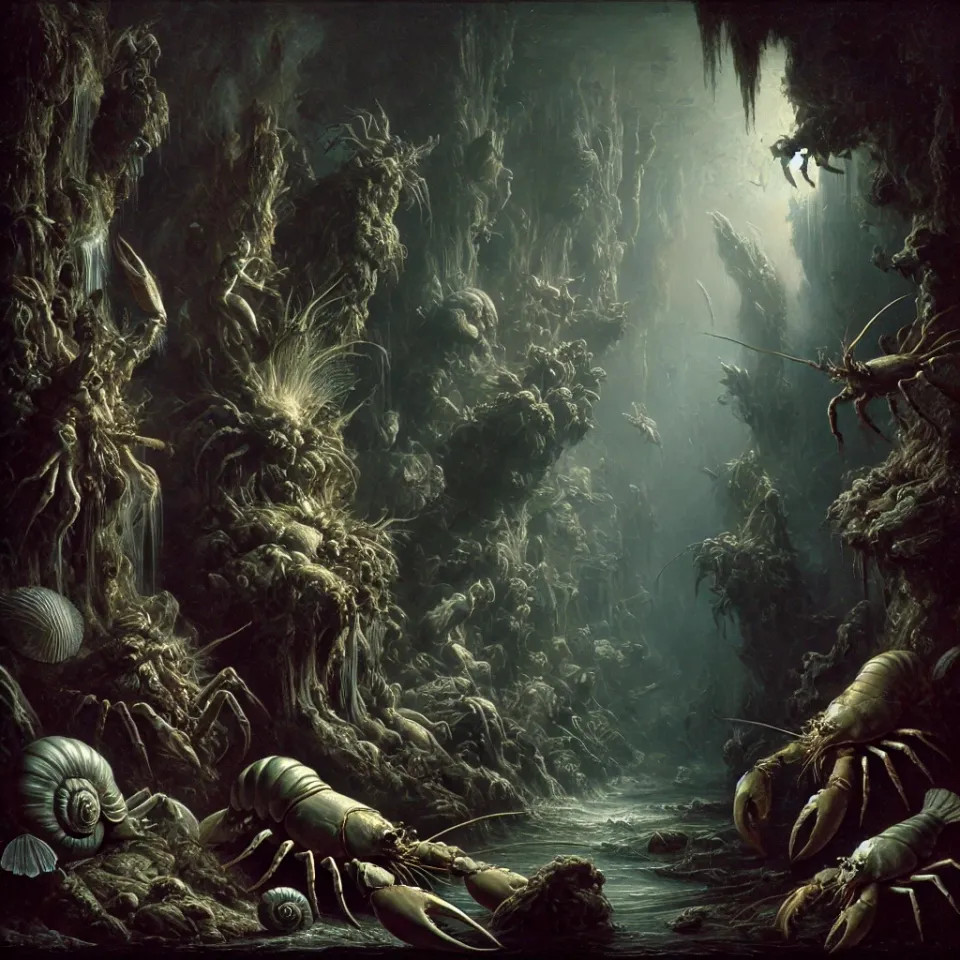Belly of the Beast

About a month ago, my seven-year-old son jumped into the ocean for the first time. Jumped in, not waded in. Not got up to his waist and then ran back squealing away from the broken waves, but leapt in. He gathered up his courage, breathed deeply, and then threw himself off a granite boulder and entered the chilly Atlantic.
Boy, did I love seeing that. I was treading water at the base of the rock, and you can imagine my cinematic pride as he came up the surface and I paddled him around to a safe exit point. Even though he's already a strong swimmer (physically, he could have done it all himself), I don't think there's any way he would've leapt in unless I was down there waiting for him.
I get it, the ocean is scary as hell.
It's always scared the crap out of me. On beach trips as a kid, I used to wail about the "Big Waddo!" and cling to the far edge of the sand. Eventually, I had enough positive experiences to genuinely fall in love with this mysterious and terrifying entity. But I know it doesn't necessarily love me back. There are plenty of dangers other than the big hungry things haunting the depths.
Despite the fact that it incubated our nervous systems for millions of years, the ocean has never exactly felt like home. Or–that's not quite right–maybe our fear of the ocean (thalassophobia is the technical term) is a perfect description of what home would feel like, if you were a little fish.
We'd constantly be afraid. Have you ever been hunted in two dimensions? How about three?
I've never fully shaken this fear, but I believe it's a good thing to get comfortable around things scary things like this. If that meant treading water with my back turned to the inky depths, then I was happy to facilitate my son's first oceanic plunge. Eventually, I hope, he'll realize he doesn't even need me there to do something so brave again.
In fact, I might have juuuust realized the whole even could possibly be a parental psychomanipulation to fulfill some vicarious need for water-based thrill on my own part.
See, his leap reminded me of a really similar one, years and years ago. And maybe I wanted him to get a taste of saltwater to remind myself that I was still brave enough to take the plunge.
Except mine was a hell of a lot scarier than his.

Sure, I was a grown up, and had spent countless hours playing in all different parts of the ocean, but I definitely contend that I had more reason to freak than the seven-year-old. For one thing, mine happened in a legendarily treacherous place: the Farallon Islands.
Anyone who knows that the Farallon Islands are tiny scraps of rocks 26 miles west of San Francisco probably also knows that they are have a superdensity of great white sharks.
Imagine you're afraid of sharks. Imagine the damn Jaws theme song plays in your head every time you try to enjoy snorkeling. Now, take a slight comfort in the knowledge that there's usually only about one Carcharodon carcharias (that nearly 20-foot long monster of the deep) per every 100 square miles. That's about the surface area of two San Franciscos.
Normally, the odds are exceedingly low of running into the man in the gray suit on any given day.
Not so in the Farallons. Here, shark density balloons more than 100-fold, so now there's one to two sharks per square mile. It's literally great white shark Manhattan.
It's impossible not to think about that as you approach the island in a small boat.
You can only get there by boat, which must get lifted above the cliffs via hydraulic cable until you get set down on the guano-covered crag. It's so wild the teeming elephant seals and seabirds barely pay any attention to the handful of biologists who live there part time.
I got a chance to spend a few weeks there in my mid-twenties as a field assistant, and I quickly fell in love. Everyone does. The five other biologists there were already smitten, and we spent our days happily cataloguing the natural beauty of this terrifyingly gorgeous world, barely believing we had it all to ourselves.
But, to be honest, majestic as the place was, a few of us were young and full of very human foibles, so we'd sometimes pass the time doing stupid things. One of which was making bets. It could have been any sort of friendly challenge, but we spent a lot of time seeing who could do what in a certain amount of time or whatever. I don't know if it's the physical isolation or just the type of personality it draws, but odd things pass for entertainment out in the wild. Societal norms just don't seem to apply so much when you're literally surrounded by two-ton elephant seals, snarling and gurgling at each other on the rocky shore.
I was involved in a number of these wagers, which became ever more escalatory in my short time away from civilization. The payment was always some physical challenge (stick your head into a dank section of this cave, or lay on a heli-pad covered in compost and let the gulls pick it off of you, or something like that).
It's a lot of fun doing something ridiculous or gross, or watching your buddy do it, when you know the rest of humanity is separate by nearly 30 miles of ocean.
I can't even remember the particular bet I lost, or how I lost it. But I very clearly remember the payoff, because adrenaline has a way of cementing experiences into the hippocampus. In any case, I had naively agreed to do one of the stupidest things you can do on the Farallons.
Go for a swim.

The conditions were unsettlingly described as "probably safe" by one of the more experienced biologists. And to be clear, it's not like I had to swim around the island or anything. It was a bet, not a suicide pact. But there aren't too many places to just dip in and out. It's not a lap pool at The Y.
Pretty much the only place that is even remotely safe to swim is a narrow inlet about 50 to 60 feet wide on the South side of the island. A narrow channel with a flat ledge to jump in from.
It's (more or less) protected from the waves and currents, so getting sucked out to sea is pretty unlikely. And as cold as Northern California water is in the early spring, a few minutes exposure won't cause hypothermia, if everything goes well.
Except the deal wasn't just a "jump in, jump out", I had to swim across the channel, and touch the wall on the other side before coming back. That was the condition of the bet. But I'm a solid swimmer, right? And how long does it really take to swim 50 feet and back, anyway?
The ocean never looks as cold or dark as it does right after you've shed your clothes and are standing right above it, still dry and basking in the sun. My colleague, the biologist who had won the bet, complied with field station honor and agreed to join me in the challenge. We perched on the edge of the rock, about five or six feet above the water.
We crawled out toes toward the edge of the rough granite. A svelte female elephant seal–no heavier than 2,000 pounds–bobbed lazily back and forth in the gentle swell. She eyed us curiously from directly below, until a bigger surge pulled her out of the mouth of the channel. And we jumped in.
After the shock hits, you can't overthink these things. Just swim.
I flew like Michael J. Phelps across that water. Fifty feet is a perfectly valid for panicking. Sprint swimming, i.e. wildly thrashing arms and legs in mortal fear of an abdomen being opened, is great for short distances.
In fact, I don't remember much of the swim over. I do recall nearly levitating out of the water onto the opposite side, which was really just a slightly submerged ledge at the base of a cliff. I took a calming breath and remembered to check for my swim buddy, who was climbing up the sharp rocks.
She winced, and I saw blood streaming down her shins. Hmmm, could that be a problem?
Panic is such a silly rationalizer. It seemed like it took me a long time to realize that she had scraped her legs on the rocks while coming up onto the ledge. I remember a dull, sickly feeling as my moron brain turned my head downward to my own legs. Rivulets of bright red blood streamed from my shins into the surging water.
Hmmm?
I think it's important to point out that I wasn't on the island to study sharks. I knew a little bit about them, but I was primarily there to count birds. I couldn't quite recall how many drops of blood at what distance a great white shark is capable of detecting. But it didn't seem like that many. And it didn't seem like that far. And actually, the mouth of the channel wasn't all that far away, and the cove where the senior biologist had just described watching a bull elephant seal get decapitated by a whitey was—oh look!–just beyond it.
Hmmm.
Well, in any case, there was no way up the cliff on this side, so it would probably behoove us to get back across the water now, unless there was a very compelling reason not to do so. How long have we been sitting here, bleeding into the water, anyway?
Then, a very compelling reason headed toward us.
I've been in and been in love with ocean ever since being terrified of it as a child, and several times I've thought I might disappear into it. I know how easily it can swallow someone up. I know how careless it can be.
I've always felt, if you're out there alone, you might as well expect to get swallowed up.
But every once in a while, the ocean does something so unbelievable that you don't care if it does.
Although there had been a small swell pushing in, it barely moved the strands of kelp growing in the channel. But it just so happened that a larger set wave (which might only happen once every 20 minutes or so) broke on the outside of the channel. It galloped toward us. Was it knee high? Waist high? High enough to knock us off the ledge and sweep us out in its backwash? Gosh, hard to tell, but it sure was getting closer fast.
As we clung to the rocks like desperate barnacles, bracing for the whitewater, hoping the backwash wouldn't be powerful enough to rip us out into the churning maw, I stared at Mother Ocean. I was helpless, amazed as only the sublime¹ can make one feel, as the foamy water dashed against the rocks around us.
Then, fifty feet away, at the ocean's entrance to our little inlet, an enormous gray body surfaced.
Okay, okay, okay. This is not a story about me getting eaten by a shark. Something unexpected did happen, but even if it hadn't, the point is that it was only my fear that was keeping me in place. And I had put myself in a position of fear because I was drawn to this extraordinary environment and I didn't want to embarrass myself in front of several other biologists whose commitment to fulfilling practical bets I deeply respected. But I really did think I was about to die, and what happened next is 100% true.
I swear on Mother Ocean.

A gigantic ocean animal broke the surface right in front of us. Slate gray back, mottled with light blotches, salt water sheeting down its sides, its relatively small dorsal fin arching into the sunlight.
A gray whale, coming to the surface.
It's body was so big it blocked the entire entrance to the channel. It rose up, bringing it's blowholes into the atmosphere and sending forth two enormous blasts, 500 liters of exhalation at 300 miles per hour, louder than a jet engine at takeoff, yet rapidly exhausting into a cloud of mist and whale snot fifteen feet tall that lingered in the air.
We knew why she was there, and we accepted her benevolence. Without a word, both of us dove back into the hissing water and dashed back to the familiar side of the channel while she guarded the entrance.
- In the sense of greatness beyond all measurement, not in the sense of Long Beach-based ska-punk-reggae band.





Comments ()